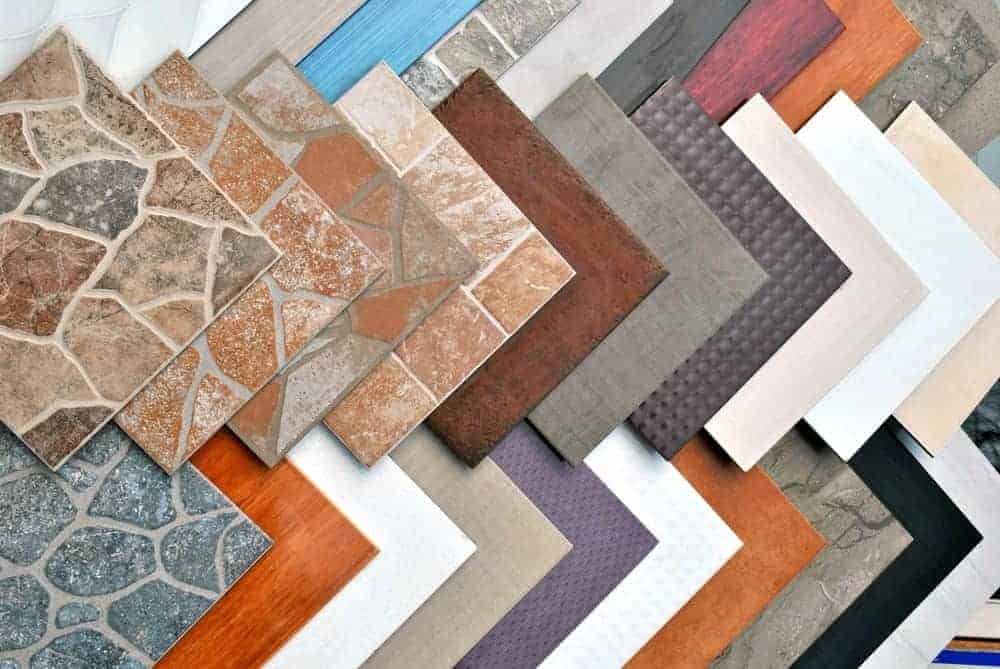
Choosing the perfect flooring for your home can be overwhelming, especially with the countless options available in the market. Selecting the wrong type of floor tile can lead to issues like poor durability, mismatched aesthetics, or costly maintenance over time.
To avoid these pitfalls, it’s essential to understand the features and benefits of various floor tiles. This article explores the different types of floor tiles in India, helping you make an informed decision to achieve the ideal blend of style, functionality, and longevity for your home.
Let’s explore the different types of floor tiles and understand how to make the right choice.
Top 10 Types of Floor Tiles In India
1. Ceramic Tiles: Versatile and Cost-Effective
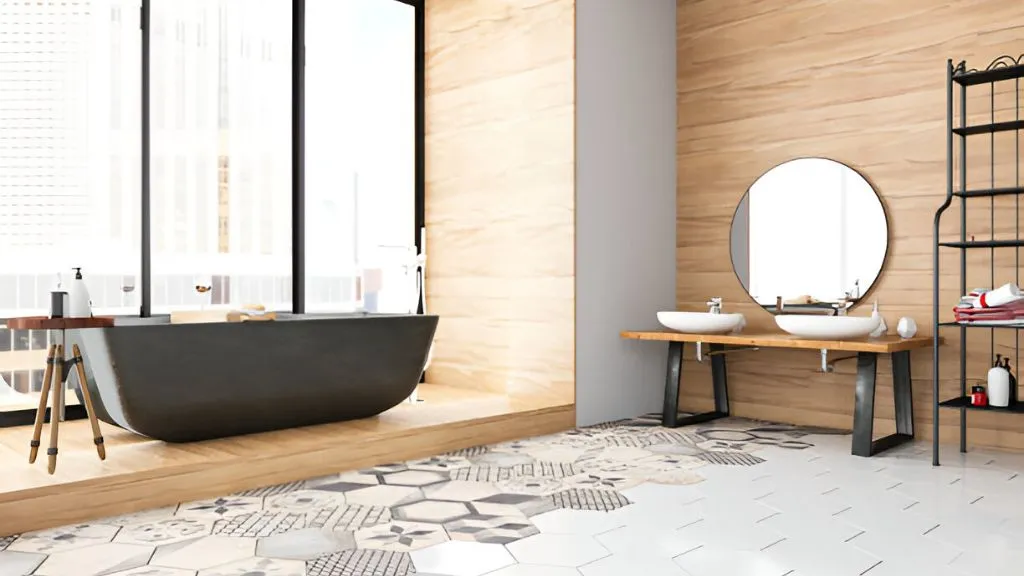
Ceramic tiles are one of India’s most popular types of tiles, known for their versatility and affordability. These tiles are crafted from natural clay and are available in a variety of styles, colors, and finishes, making them suitable for both walls and floors. Whether you’re looking for floor tiles for home or a stylish upgrade, ceramic tiles cater to all.
- Benefits: Durable, low maintenance, and resistant to water and stains.
- Disadvantages: May chip or crack under heavy impact.
- Suggestions: Use ceramic tiles in areas like kitchens, bathrooms, and living spaces for a sleek and clean look. Explore floor tiles with marble designs within ceramic options for a unique aesthetic.
- What to Take Care Of: Choose glazed options for water-prone areas, and check for anti-skid finishes for bathrooms or outdoor use.
2. Porcelain Tiles: Durable and Luxurious
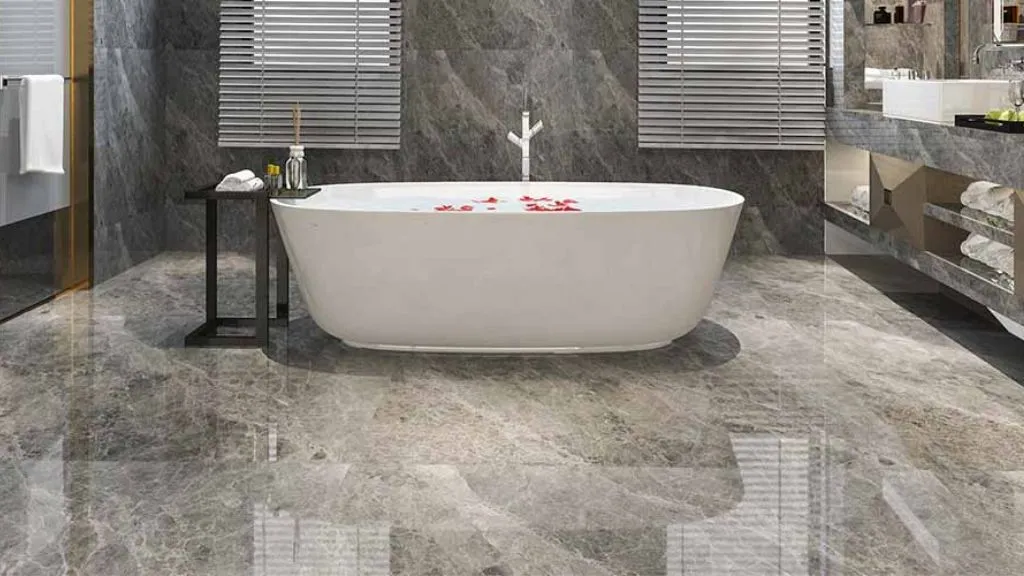
Porcelain tiles are a more refined version of ceramic tiles, offering exceptional durability and an elegant appearance. These types of floor tiles are denser, less porous, and available in various patterns, including matte and glossy finishes. Porcelain tiles are perfect for achieving a polished look with minimal upkeep.
- Benefits: Scratch-resistant, water-resistant, and ideal for high-traffic areas.
- Disadvantages: Relatively expensive compared to ceramic tiles.
- Suggestions: Opt for porcelain tiles for areas like hallways or commercial spaces where durability is essential. For an upscale vibe, pair them with floor tile designs for the hall to enhance the overall aesthetic.
- What to Take Care Of: Ensure the subfloor is level before installation, as uneven surfaces can compromise their durability.
3. Marble Tiles: Timeless Elegance
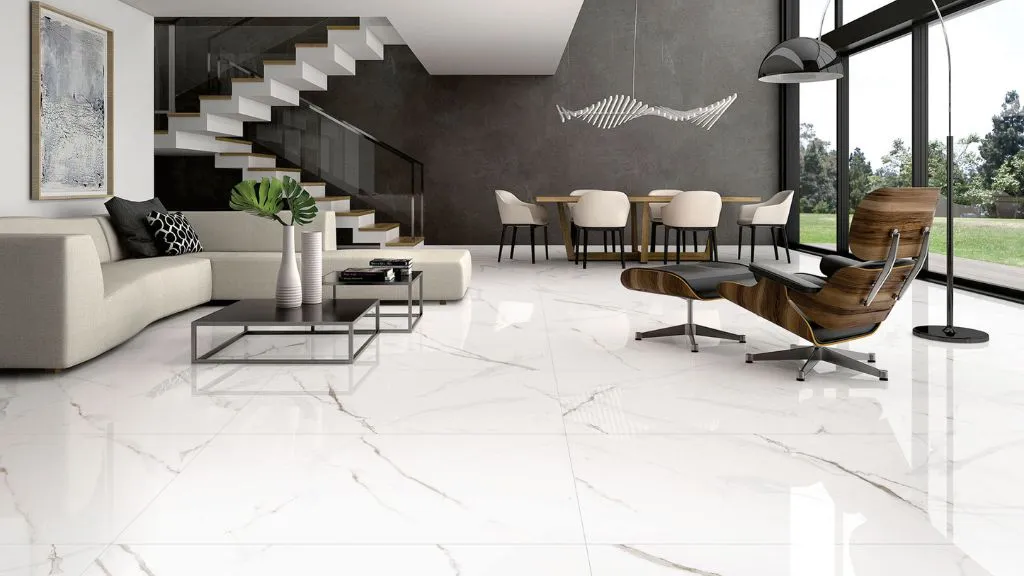
Floor tiles with marble designs are synonymous with luxury and sophistication. Available in a range of patterns and colors, marble flooring add timeless beauty to any space. They are a favourite among homeowners seeking to create a grand and elegant ambience.
- Benefits: Stunning aesthetics and excellent durability.
- Disadvantages: Expensive and prone to staining if not sealed properly.
- Suggestions: Use marble tiles in living rooms or bedrooms to create a luxurious look. Polished marble tiles reflect light, making smaller rooms appear larger.
- What to Take Care Of: Regular sealing is crucial to prevent stains and maintain their shine. Avoid abrasive cleaners to preserve their finish.
4. Vitrified Tiles: A Modern Classic
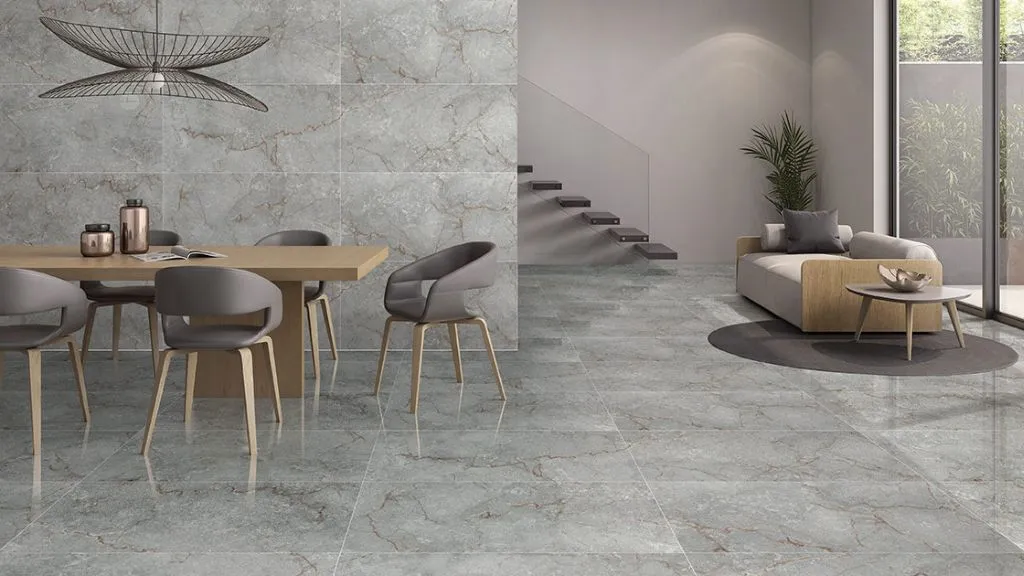
Vitrified tiles are a popular choice in India due to their durability and resemblance to natural stone. These different types of floor tiles are created through a vitrification process, making them harder and less porous than ceramic tiles.
- Benefits: Scratch-resistant, water-resistant, and low maintenance.
- Disadvantages: Slightly costlier than ceramic tiles.
- Suggestions: Use vitrified tiles for areas with high foot traffic, such as kitchens and hallways. They are ideal for contemporary spaces.
- What to Take Care Of: Always opt for anti-skid finishes for safety, especially in wet areas like bathrooms.
5. Mosaic Tiles: Artistic Appeal

Mosaic tiles are small tiles arranged to form intricate patterns or designs, making them an artistic addition to interiors. These types of tiles are versatile and can be used for both decorative and functional purposes, adding a touch of creativity to any space.
- Benefits: Unique and customizable.
- Disadvantages: Installation can be time-consuming.
- Suggestions: Use mosaic tiles in accent walls, kitchen backsplashes, or bathrooms for a stylish statement. Explore patterns that complement your wardrobe colour design for a cohesive look.
- What to Take Care Of: Ensure professional installation for seamless alignment and a clean finish.
6. Natural Stone Tiles: Rustic Charm
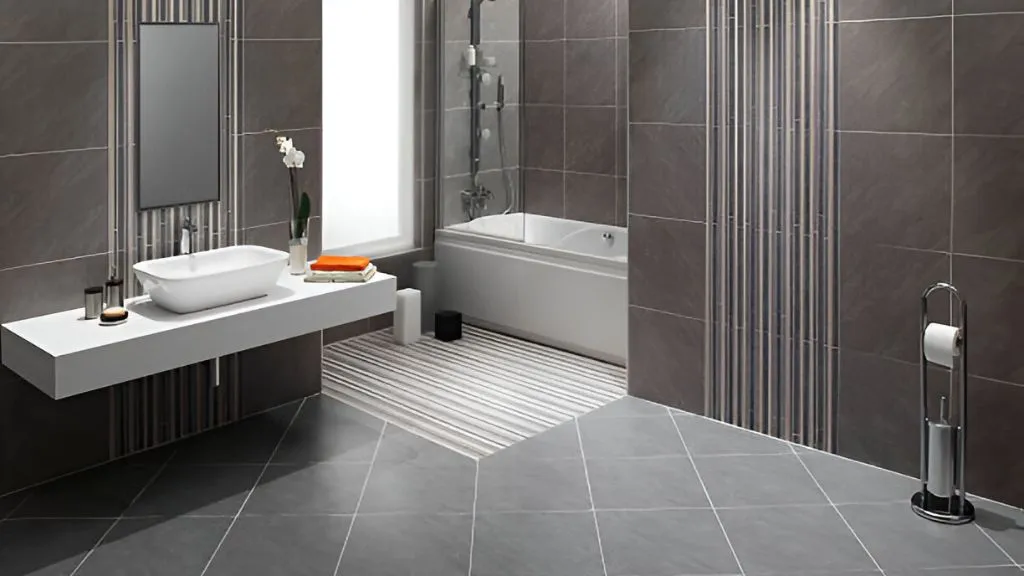
Natural stone tiles, including granite, slate, and limestone, bring earthy textures and rustic appeal to interiors. These floor tiles for the home add character and are perfect for creating a warm and natural ambience.
- Benefits: Durable and unique in appearance.
- Disadvantages: Expensive and requires regular maintenance.
- Suggestions: Ideal for outdoor areas or living rooms where a natural aesthetic is desired. Pair with classy wardrobe laminate color combinations for a harmonious design.
- What to Take Care Of: Seal the tiles periodically to prevent moisture absorption and maintain their natural beauty.
7. Wooden Tiles: Warmth and Elegance
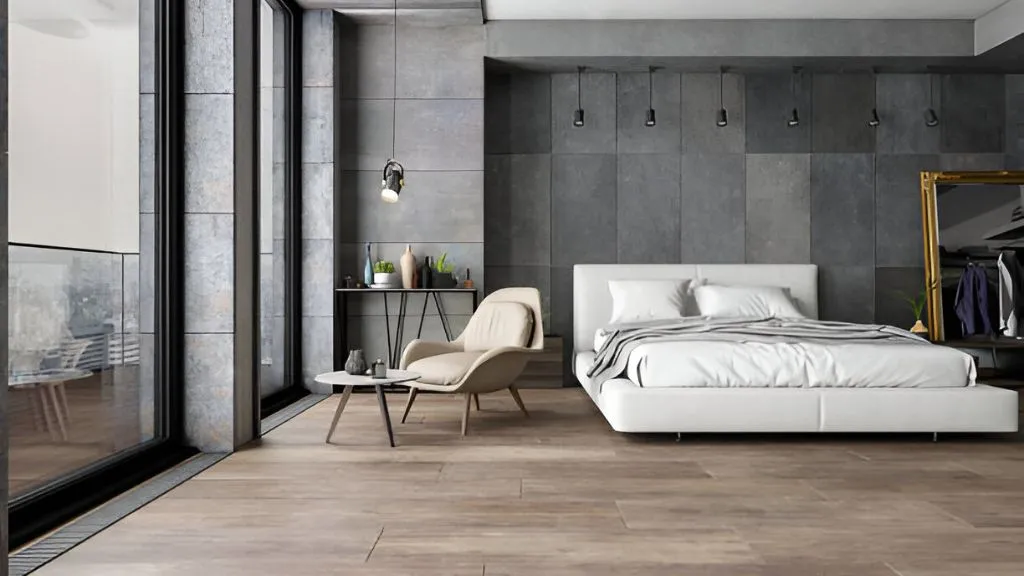
Wooden tiles mimic the look of natural wood while offering the durability of tiles. These different types of tiles are perfect for adding warmth and coziness to interiors without the upkeep of real wood.
- Benefits: Aesthetic appeal and low maintenance.
- Disadvantages: Limited options in high-moisture areas.
- Suggestions: Use wooden tiles in bedrooms or living rooms to achieve a modern yet cozy vibe. Explore options from floor tile manufacturers in India for quality designs.
- What to Take Care Of: Choose water-resistant options for areas like kitchens or bathrooms.
8. Cement Tiles: Bold and Trendy
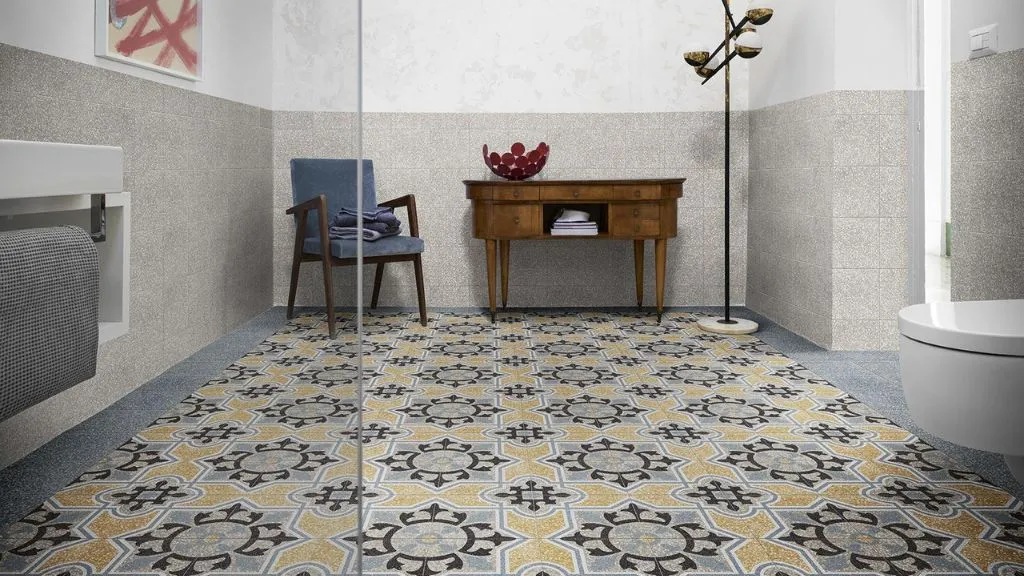
Cement tiles, also known as encaustic tiles, are making a comeback with their bold patterns and vibrant colors. These types of tiles in India are handmade, ensuring unique designs for every piece.
- Benefits: Highly customizable and visually striking.
- Disadvantages: Porous and requires sealing.
- Suggestions: For a striking impression, use cement tiles in statement areas like entryways or as floor tiles for halls.
- What to Take Care Of: Seal the tiles to protect them from stains and moisture damage.
9. Terrazzo Tiles: Retro Meets Modern
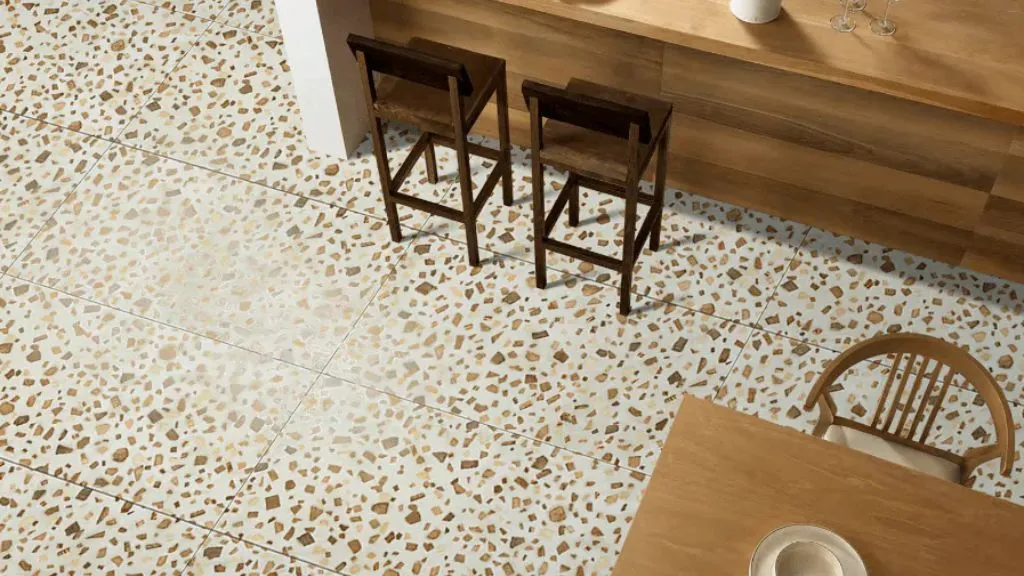
Terrazzo tiles are a composite of marble, quartz, and other materials, offering a retro yet modern look. These floor tiles are gaining popularity for their durability and distinctive patterns.
- Benefits: Durable and eco-friendly.
- Disadvantages: Expensive and requires professional installation.
- Suggestions: Terrazzo tiles are perfect for living rooms and commercial spaces. They work well in areas where you want a mix of aesthetic appeal and long-lasting functionality.
- What to Take Care Of: Polish regularly to maintain their glossy finish and protect against wear.
10. Glass Tiles: Reflective Brilliance
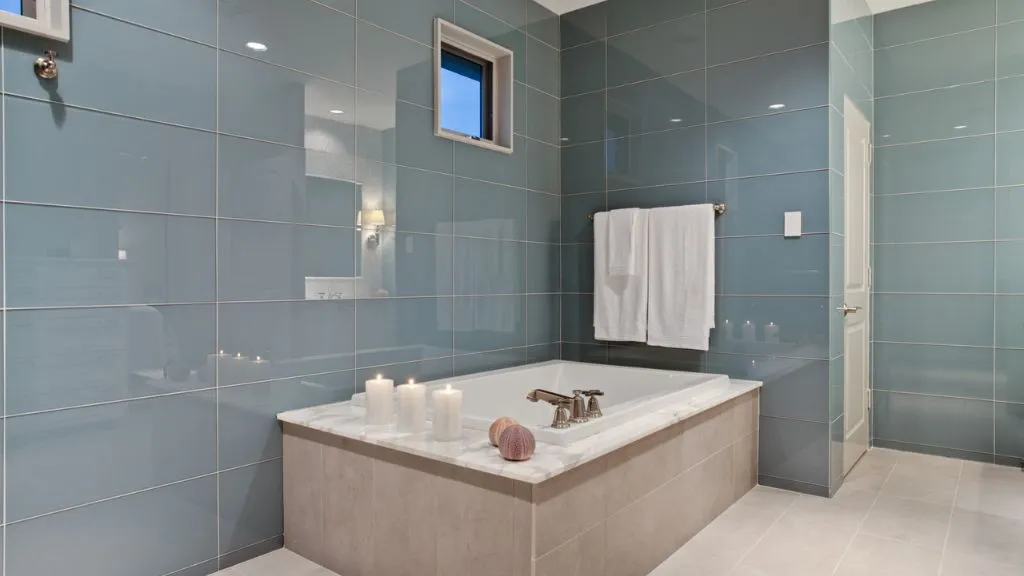
Glass tiles add a touch of elegance and brightness to any space. These new model floor tiles are perfect for creating light-filled and vibrant interiors.
- Benefits: Easy to clean and visually appealing.
- Disadvantages: Prone to scratches and cracks.
- Suggestions: Use glass tiles in kitchens or bathrooms for a sleek and modern look. They can also be incorporated into kitchen wardrobe colour combinations for a cohesive design.
- What to Take Care Of: Handle with care during installation and avoid heavy impacts to prevent cracking.
Conclusion: Choose the Best Floor Tiles for Your Home
With so many different types of floor tiles available, finding the perfect one for your home can be exciting yet overwhelming. By understanding the benefits, drawbacks, and best practices for each option, you can make an informed decision.
Whether you prefer the elegance of floor tiles with a marble design or the durability of porcelain tiles, there’s a choice for every style and budget. For quality assurance, consider exploring options from leading floor tile manufacturers in India like Johnson and Somany to transform your living space into a dream home.
Different Types of Floor Tiles FAQs:
1. What are the types of tiles?
1. Ceramic Tile
2. Porcelain Tile
3. Glass Tile
4. Cement Tile
5. Marble Tile
6. Mosaic Tile
7. Granite Tile
8. Limestone Tile
9. Travertine Tile
10. Quarry Tile
11. Metal Tile
12. Resin Tile
2. Which are the best tiles for flooring?
3. What are the types of ceramic tiles?
4. What is a Travertine tile?
5. Which tiles are cheap and best?
1. Porcelain Tiles
2. Ceramic Tiles
3. Natural Stone Tiles
4. Terracotta Tiles
5. Vitrified Tiles
6. Laminated Wooden Flooring






